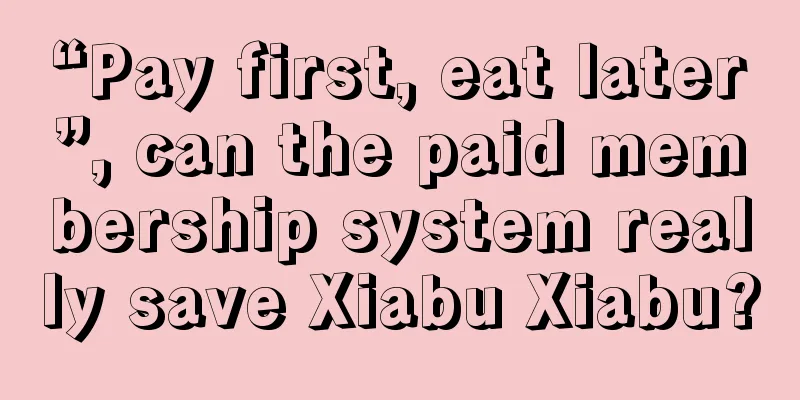Young people who are so sophisticated and stingy are turning supermarkets into outlet malls

"From snacks to supermarkets, the discount trend is spreading." The “discount trend” in the snack industry has finally reached the supermarket industry, except that it has been given a nicer name – outlet. Recently, Dingdong Maicai opened its first outlet store in the country in Shanghai. The store numbered 001 is located in Jiuting, Songjiang. In the fresh food supermarket industry, the first to debut as an "outlet" was Hema, which is used to making changes. In October 2021, Hema's first outlet store officially opened in Pudong, Shanghai. In less than two years, Hema Outlets has expanded beyond Shanghai and into the whole country. Not long ago, at Hema's annual New Retail Conference, CEO Hou Yi not only expressed his intention to fully embrace discounting, but also announced a small goal of opening 100 outlet stores in Shanghai by the end of the year. Unlike Hema, which has grown both online and offline, Dingdong has always taken its own path with the "forward warehouse" business model. Even when MissFresh failed and the outside world was full of doubts about the forward warehouse model, it did not shake Dingdong's determination to stick to the online business. However, Dingdong's first "offline" entry into the market is through outlets, which is quite interesting. Not long ago, Dingdong released its third-quarter financial report, which showed that Dingdong Maicai achieved revenue of 5.14 billion yuan, a month-on-month increase of 6.2%, and GMV of 5.67 billion yuan, a month-on-month increase of 6.4%. However, the joy of profit cannot hide the sluggish stock price. Dingdong may need a new story. Dingdong is not the only one that wants to tell a story with discounts. In October this year, Yonghui Supermarket announced that it would add "authentic discount stores" to its stores across the country, and simultaneously add discount areas to its online apps and mini-programs to offer discounted food and supplies. So why are supermarkets obsessed with discounts? What is the essence of discounts? 1. The general trend in the new economic cycleOutlets is the full name of Outlets. In the retail industry, it usually refers to the sale of out-of-season, out-of-stock or unavailable shoes, clothing, bags and other goods. In the beginning, Outlets were mainly channels for factories to deal with their tail goods, so they were also called "factory direct stores." As an innovator in the domestic fresh food industry, Hema was the first to introduce the outlet concept. In 2021, Hema opened its first outlet store in Shanghai, mainly selling near-expiry, short-shelf-life and perishable goods, such as fresh fruits and vegetables, milk and bakery products. At the beginning of its opening, many citizens took the bus to shop because of the large discounts. However, at that time, the birth of outlets was somewhat seen as a necessary measure to digest Hema's leftover goods, expiring products and inventory, and some people even expressed their disapproval of this model. Who would have thought that the discounts represented by outlets would become a big business? Earlier, Hou Yi announced at the New Retail and Supply Conference that Hema Outlets has become one of the three major business units along with X Membership Store and Hema Fresh. This strategic change is not without trace. In the first black label store newly opened by Hema this year, Hema Outlet has a place. At first glance, it seems a bit out of place, but Hu Liang, chief designer of the black label store, said that Outlet is doing some product stratification, and entering the black label store is a test. In the future, it may enter the shopping mall alone in the form of a brand discount store. Not long ago, Professor Chen Liping, Executive Director of the Institute of Consumer Big Data of Capital University of Economics and Business, said in a public speech that China's retail industry will enter an era of low prices . He believes that there are two reasons for this. First, the prices of goods in Chinese department stores and supermarkets are too high and urgently need to be changed. Second, China, as the world's factory, has not been able to produce a discount brand with national influence, which is extremely "unscientific". In addition, the continued high cost of online customer acquisition and fulfillment has, to some extent, fueled the return of companies to physical stores. Compared with online stores, the rent and equipment of physical stores are one-time investments, which have the advantage of marginal costs. For example, Hema Outlets are mostly located in densely populated residential areas, and their stores are small, which saves a lot of rent costs. As nearby residents gradually form the habit of buying, they can just walk to the community outlet store with friends in the evening, and the word-of-mouth effect can greatly reduce marketing costs. Online, consumers are only "loyal" to price. For the same brand, as long as a certain channel offers subsidies or discounts, it will only take a few minutes for consumers to switch to a competitor. Consumers have a real sense of these changes. For example, many people have found that the discounted prices of some products in offline channels are cheaper than online. "At the Hema Outlet near my home, a box of Kawasaki hot pot seasoning only costs 2.1 yuan, but in Kawasaki's official flagship store, after various combinations and discounts, the cheapest price is 3.5 yuan a box." Ms. Feng, who loves to eat hot pot at home, said she was shocked when she accidentally compared the unit prices. Guotai Junan once pointed out in an in-depth report on the discount retail industry that discount retail companies are often born when the economy or consumption enters a new cycle. For example, Japan's MUJI, Don Quijote, and Germany's ALDI and LIDL all rose in the new cycle. Today, China is entering a new economic cycle. As a first-tier city, Shanghai has always been the main battlefield of the fresh food industry. Embracing discounts has become a general trend. 2. Why do discount stores always open in communities?Judging from the location selection of German discount supermarket giant Aldi and Hema Outlets in China, densely populated communities are basically the first choice for discount stores. This is of course based on considerations of population flow and hard costs such as rent. Ding Dong's first outlet store is also located in a community. After visiting the site, I found that the store is located at the intersection of Jiudu Road and Laiyin Road in Songjiang District, and the entire store is located at the corner of the intersection. There are more than ten residential areas within one kilometer, including Mocha Town, Huixian Pavilion, Zhongda Jiulide, and Lvting Shangcheng. The population density is not small, and the surrounding supporting commercial facilities are mature. Although it is about 2 kilometers away from the subway station, there is a bus 200 meters away that can directly reach it. However, when I visited the store, it was only a week after the store opened, and the store was no longer as crowded as it was at the opening. It could even be described as a little deserted. Most of the customers in the store were nearby residents, especially the elderly, and the products they selected were mainly daily fresh products such as vegetables, fruits, and eggs. Unlike Hema Outlet, which mainly sells tail goods, discounts and its own products, Dingdong said that the products of Outlet and Dingdong Maicai are from the same supply chain system, so there is no quality grading of products. The low price is mainly due to bulk purchases and the cost reduction brought by large packaging. In addition, I also found some Dingdong's own-brand products outside the door, such as a box of soft tofu, which costs no more than 1 yuan. However, judging from the current SKUs, the number of own-brand products is still small. In front of the meat refrigeration cabinet, a young mother with a child said that the prices of goods in the store are indeed competitive compared with those in the surrounding vegetable markets. For example, you can buy 30 free-range eggs for 15.9 yuan, but some packages are too large. "For example, pork belly, although a 3-jin package is only sold for 39.9 yuan, a family of three can't finish it in one meal." This is indeed a bit unreasonable. The positioning of fresh food supermarkets in communities is to meet the immediate needs of surrounding residents, rather than large-scale purchases in membership stores. In other words, if customers can buy low-priced fresh products conveniently every day, there is no need for customers to buy large packages of goods and freeze them in the refrigerator to eat slowly. In addition to specifications, there are many challenges in offline operations of community stores. For example, the elderly are very sensitive to the prices of fresh products such as vegetables and fruits, and they often benchmark the prices at the farmer's market near their homes. Even if the price difference is only a dime, they may turn to the farmer's market, so pricing strategy is also critical . In addition, it is worth considering whether supermarkets choose products based on their own advantages or based on consumer demand. After all, the needs of the elderly and the young are completely different. Previously, Dingdong Maicai has been focusing on the online forward warehouse business, but online and offline require two different "play styles". Especially for the outlet business, its nature determines that it must have a refined operation team to control the cost of all links, and ultimately ensure that the store forms its own profit model. When experiencing the outlet store, I also found that Dingdong Outlet and Dingdong Maicai are currently supported by two independent systems. Not only are the product specifications and prices different, but the membership system is also not connected. The recharge card or membership card on Dingdong Maicai cannot be used in the outlet store. The clerk explained that the prices in the outlet stores were already very cheap, so credit cards were not accepted. Obviously, this could not convince consumers, especially recharge card users. In the future, if outlet stores want to expand further, they will have to pay attention to how to connect online and offline. 3. What is the value of discounts?"1.69 yuan for 500 grams of green vegetables, 9.9 yuan for 1.5 kilograms of Ehime jelly oranges, 3.4 yuan for a serving of grapefruit..." These fresh produce prices, which are cheaper than those in vegetable markets and fruit stalls, are contributed by Dingdong. "8.9 yuan for 950ml of fresh milk, 9.9 yuan for 100g of facial cleanser, 9.9 yuan for 500g of shampoo, 11.9 yuan for 150g of pork jerky..." These prices are brought by Aldi. Just a few days after Ding Dong Outlet opened, Aldi announced the launch of its new Aldi "Super Value" series, which covers everything consumers need in their daily lives, from meat, poultry, eggs, milk, fruits and vegetables to household cleaning products. So, is discount just a competition of who has the lowest price? Based on the discount supermarket formats in other countries around the world, the real value of discount is to offer good products at low prices. Professor Chen Liping cited the example of LOPIA, a Japanese discount supermarket. This Japanese online celebrity supermarket has three simple and unadorned business philosophies:
To achieve the best quality-price ratio, we need to establish an optimal supply chain system on the one hand, and finely manage store operations on the other. So, where should we start to achieve the ultimate supply chain efficiency? Industry insiders believe that there are four main aspects: first, reducing costs from the raw material procurement end through large-scale production; second, reducing costs from the manpower end through the use of automated equipment; third, reducing costs from the technology end through technological innovation; and fourth, reducing costs from the circulation end by directly delivering goods from the factory to the store. In addition, private brands are also a great profit magic weapon in the discount industry. For example, Aldi has up to 90% of its own products. In the membership store track, Costco and Sam's Club have built a strong brand moat for themselves through the establishment and development of private brands. At present, both Hema and Dingdong are working hard on the development of their own brands. Obviously, whether it is the fresh food track, supermarket track or discount track, the commodity power formed by the own brand can help the brand form a competitive barrier. However, supply chains and private brands cannot completely resolve the competitive crisis faced by discount supermarkets. Competition in the discount industry also depends on a refined operational management model to control and reduce various costs. Among these, the word "restraint" is particularly important - the number of SKUs should be restrained, store decoration should be restrained, product packaging should be restrained, and even profits should be restrained... This may be the survival code for those well-known discount supermarkets to survive economic cycles. *Except for those marked, all the pictures in this article are taken by New Retail Business Review Author: Tian Qiaoyun; Editor: Ge Weiwei Source: WeChat official account: New Retail Business Review (ID: xinlingshou1001) |
<<: Are public accounts facing challenges in private domain traffic?
Recommend
Activating existing customers: Common paths for banks to add micro-enterprise customers
In the current digital transformation, many banks ...
What does Amazon KYC mean? Will Amazon send email notifications for KYC audits?
KYC is a procedure used to verify the identity of ...
An unacceptable fact: Side jobs are not about the level of skills, but about stable customer demand.
After working in the workplace for many years, I a...
Can individuals register on Jumia? What do I need to prepare to open a store on Jumia?
Nowadays, e-commerce is developing very fast in ma...
Should you build your brand for the long term or sell products as soon as they go online? How should you launch new products for different operational purposes?
In the previous article, we analyzed Liana, FunnyE...
Ali is starting to get twisted
Recently, Alibaba has made many updates to Taobao,...
The business of childhood: How brands market to children
This article will explore in depth how brands and ...
10,000-word analysis | 2024 brand KOC marketing full-domain strategy
In the new year, will KOC marketing still be as po...
How can ordinary people do cross-border e-commerce? How to participate?
There are actually quite a lot of merchants doing ...
How to correctly view local life live broadcast?
This article first talks about the fact that the m...
Working 24 hours a day, are digital people going to take away the jobs of anchors?
Hyper-realistic digital humans are 1:1 digital rep...
How is it to be a seller on WishGo? How does Wish earn its commission?
WishGo has attracted many sellers with its unique ...
Attention! More than 80% of merchants ignore these 5 functions of Xiaohongshu Enterprise Account
Xiaohongshu Enterprise Account has many functions....
How to make a brand younger?
Times are changing, and brands need to change too....
After writing 1,000 popular articles on Xiaohongshu, I summarized these popular article routines
Creating a popular article on Xiaohongshu is often...









